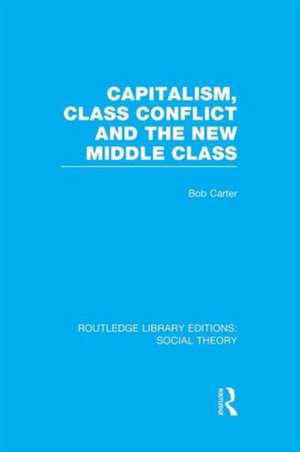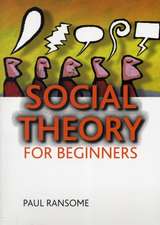Capitalism, Class Conflict and the New Middle Class (RLE Social Theory): Routledge Library Editions: Social Theory
Autor Bob Carteren Limba Engleză Paperback – 9 dec 2015
Focusing on the class position of managerial and supervisory workers, Robert Carter takes as his starting-point the inadequacy of both orthodox Marxist and Weberian models of class relations. Rather, he concurs with recent structuralist theorists of class who maintain that there exists between capital and labour in the process of producing a new middle class. He parts company from the work of these theorists, however, in his insistence that the organisation and consciousness of the new middle class have also to be examined because of the practical consequences these have on class relations.
The book therefore examines the historical rise of the middle class, both in the private and the state sector, together with the tendency of the class to respond to its changing relations with capital and labour by unionising. It is sharply critical of the dominant models of the causes and nature of white-collar unionism – both industrial relations and Weberian ones – and indeed rejects these models in favour of a perspective which views the extent and nature of middle-class unionism within the dynamics of class relations.
| Toate formatele și edițiile | Preț | Express |
|---|---|---|
| Paperback (1) | 341.55 lei 3-5 săpt. | +22.67 lei 7-13 zile |
| Taylor & Francis – 9 dec 2015 | 341.55 lei 3-5 săpt. | +22.67 lei 7-13 zile |
| Hardback (1) | 1002.63 lei 6-8 săpt. | |
| Taylor & Francis – 8 aug 2014 | 1002.63 lei 6-8 săpt. |
Din seria Routledge Library Editions: Social Theory
-
 Preț: 288.80 lei
Preț: 288.80 lei - 55%
 Preț: 658.96 lei
Preț: 658.96 lei - 34%
 Preț: 623.81 lei
Preț: 623.81 lei - 34%
 Preț: 764.20 lei
Preț: 764.20 lei - 34%
 Preț: 652.62 lei
Preț: 652.62 lei - 15%
 Preț: 611.89 lei
Preț: 611.89 lei - 34%
 Preț: 765.01 lei
Preț: 765.01 lei - 18%
 Preț: 847.16 lei
Preț: 847.16 lei - 34%
 Preț: 624.60 lei
Preț: 624.60 lei - 34%
 Preț: 822.34 lei
Preț: 822.34 lei - 34%
 Preț: 850.99 lei
Preț: 850.99 lei - 34%
 Preț: 679.92 lei
Preț: 679.92 lei - 34%
 Preț: 678.28 lei
Preț: 678.28 lei - 34%
 Preț: 765.43 lei
Preț: 765.43 lei - 15%
 Preț: 555.94 lei
Preț: 555.94 lei - 33%
 Preț: 498.99 lei
Preț: 498.99 lei - 34%
 Preț: 624.60 lei
Preț: 624.60 lei - 34%
 Preț: 680.31 lei
Preț: 680.31 lei - 34%
 Preț: 765.01 lei
Preț: 765.01 lei - 22%
 Preț: 311.93 lei
Preț: 311.93 lei - 34%
 Preț: 624.60 lei
Preț: 624.60 lei - 18%
 Preț: 888.99 lei
Preț: 888.99 lei - 34%
 Preț: 624.21 lei
Preț: 624.21 lei - 18%
 Preț: 1005.80 lei
Preț: 1005.80 lei - 34%
 Preț: 765.84 lei
Preț: 765.84 lei - 34%
 Preț: 823.99 lei
Preț: 823.99 lei -
 Preț: 330.87 lei
Preț: 330.87 lei - 34%
 Preț: 622.99 lei
Preț: 622.99 lei - 18%
 Preț: 1060.25 lei
Preț: 1060.25 lei - 34%
 Preț: 678.69 lei
Preț: 678.69 lei - 18%
 Preț: 886.63 lei
Preț: 886.63 lei - 34%
 Preț: 678.28 lei
Preț: 678.28 lei - 34%
 Preț: 623.81 lei
Preț: 623.81 lei - 34%
 Preț: 682.65 lei
Preț: 682.65 lei - 31%
 Preț: 454.52 lei
Preț: 454.52 lei - 34%
 Preț: 765.43 lei
Preț: 765.43 lei - 25%
 Preț: 277.11 lei
Preț: 277.11 lei - 34%
 Preț: 763.78 lei
Preț: 763.78 lei - 33%
 Preț: 554.64 lei
Preț: 554.64 lei - 34%
 Preț: 680.73 lei
Preț: 680.73 lei - 34%
 Preț: 764.62 lei
Preț: 764.62 lei - 34%
 Preț: 991.80 lei
Preț: 991.80 lei - 34%
 Preț: 763.78 lei
Preț: 763.78 lei - 34%
 Preț: 622.59 lei
Preț: 622.59 lei - 34%
 Preț: 764.62 lei
Preț: 764.62 lei - 18%
 Preț: 1059.45 lei
Preț: 1059.45 lei - 18%
 Preț: 1000.27 lei
Preț: 1000.27 lei
Preț: 341.55 lei
Nou
Puncte Express: 512
Preț estimativ în valută:
65.37€ • 67.98$ • 54.70£
65.37€ • 67.98$ • 54.70£
Carte disponibilă
Livrare economică 22 februarie-08 martie
Livrare express 08-14 februarie pentru 32.66 lei
Preluare comenzi: 021 569.72.76
Specificații
ISBN-13: 9781138965348
ISBN-10: 1138965340
Pagini: 272
Dimensiuni: 156 x 234 x 14 mm
Greutate: 0.45 kg
Ediția:1
Editura: Taylor & Francis
Colecția Routledge
Seria Routledge Library Editions: Social Theory
Locul publicării:Oxford, United Kingdom
ISBN-10: 1138965340
Pagini: 272
Dimensiuni: 156 x 234 x 14 mm
Greutate: 0.45 kg
Ediția:1
Editura: Taylor & Francis
Colecția Routledge
Seria Routledge Library Editions: Social Theory
Locul publicării:Oxford, United Kingdom
Cuprins
1. Sociology, Marxism and the Class Structure of Capitalist Societies 2. Marx, Marxism and the New Middle Class 3. Monopoly Capitalism and the Rise of the New Middle Class 4. The State and the New Middle Class 5. The Theory of Middle-Class Trade Unionism 6. The Practice of Middle-Class Unionism 7. Conclusion: The Politics of the New Middle Class
Descriere
Non-manual workers are fast becoming the largest occupational category in Western capitalist countries. This is the first book to present a detailed socialist analysis of this much discussed change in the class structure of contemporary capitalism.
Focusing on the class position of managerial and supervisory workers, Robert Carter takes as his starting-point the inadequacy of both orthodox Marxist and Weberian models of class relations. Rather, he concurs with recent structuralist theorists of class who maintain that there exists between capital and labour in the process of producing a new middle class. He parts company from the work of these theorists, however, in his insistence that the organisation and consciousness of the new middle class have also to be examined because of the practical consequences these have on class relations.
The book therefore examines the historical rise of the middle class, both in the private and the state sector, together with the tendency of the class to respond to its changing relations with capital and labour by unionising. It is sharply critical of the dominant models of the causes and nature of white-collar unionism – both industrial relations and Weberian ones – and indeed rejects these models in favour of a perspective which views the extent and nature of middle-class unionism within the dynamics of class relations.
Focusing on the class position of managerial and supervisory workers, Robert Carter takes as his starting-point the inadequacy of both orthodox Marxist and Weberian models of class relations. Rather, he concurs with recent structuralist theorists of class who maintain that there exists between capital and labour in the process of producing a new middle class. He parts company from the work of these theorists, however, in his insistence that the organisation and consciousness of the new middle class have also to be examined because of the practical consequences these have on class relations.
The book therefore examines the historical rise of the middle class, both in the private and the state sector, together with the tendency of the class to respond to its changing relations with capital and labour by unionising. It is sharply critical of the dominant models of the causes and nature of white-collar unionism – both industrial relations and Weberian ones – and indeed rejects these models in favour of a perspective which views the extent and nature of middle-class unionism within the dynamics of class relations.












